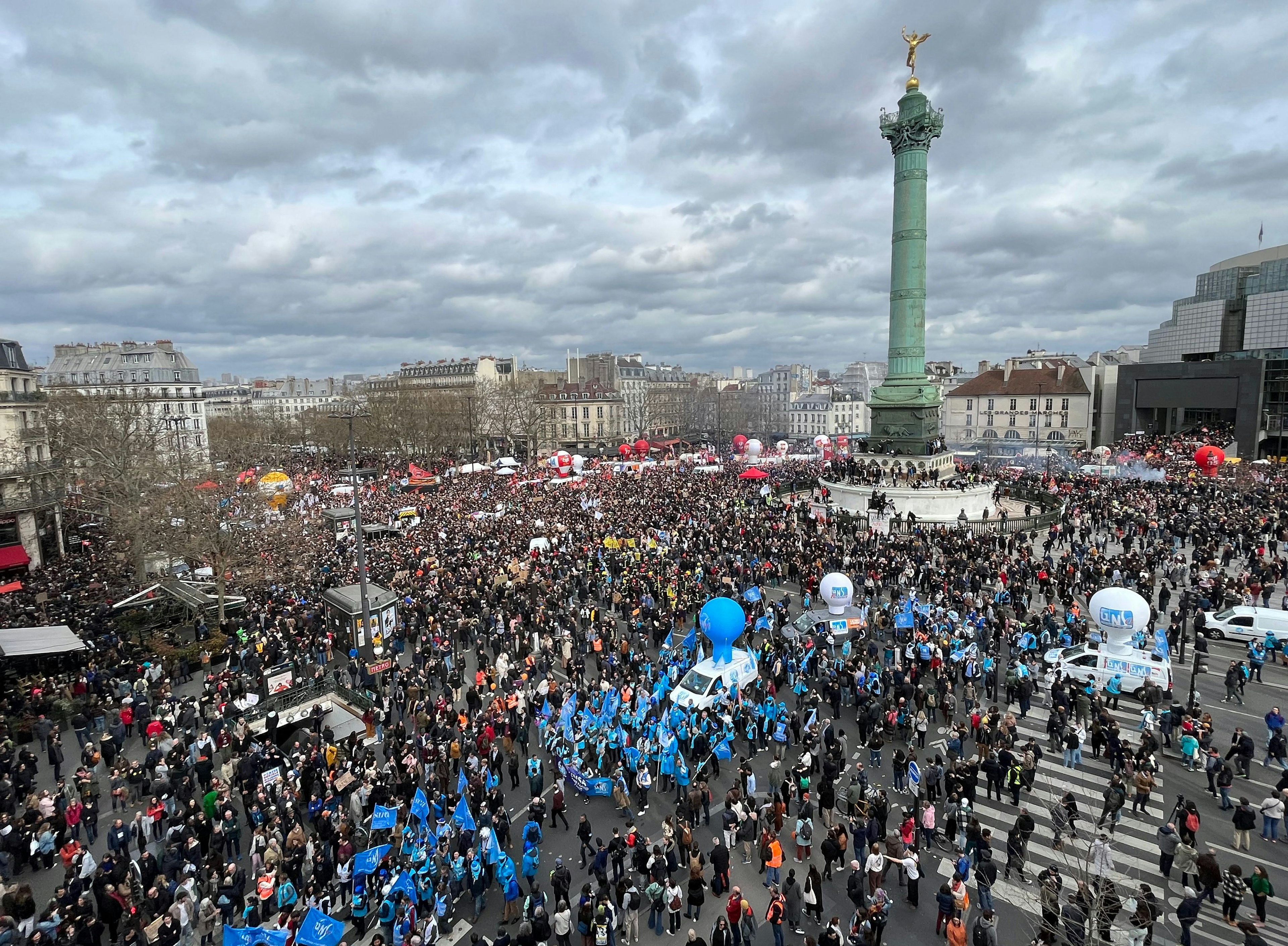
Protests in Paris: how unrest could impact Easter travel plans

Mar 31, 2023 • 5 min read

Paris has been gripped by strikes and demonstrations related to the recent, controversial pension reform. Left Bank bistro La Rotonde was damaged on the 11th day of action © Julian de Rosa/AFP via Getty Images
Over the last few weeks, images of overflowing garbage bins and violent street protests in Paris have dominated the international news cycle – raising qualms among travelers.
If you have plans to visit the French capital this spring, here’s the low-down on how to experience the city fully – but safely.
What’s happening in France and why are people striking?
Over the last three months, the government’s unpopular pension-reform scheme, which will gradually raise the age of retirement from 62 to 64, has unleashed a wave of discontent in France.
The level of anger and violence escalated after the government used a controversial executive power to push through the bill without putting it to a vote in parliament, where it faced fierce opposition.
Millions of people have marched in union-organized protests since they began in January. The 11th day of protests took place this week on Thursday April 6 with trains and planes disrupted as well as hundreds of thousands taking to the streets to demonstrate. Left Bank brasserie La Rotonde, a haunt of President Macron, saw it's awning set on fire. Trade unions have vowed to continue staging rolling strikes until the bill is withdrawn.

Is it safe to visit Paris?
Since October 2022, the US State Department has placed France at a Level 2 travel advisory, which recommends that citizens exercise “increased caution” due to threats of terrorism and civil unrest.
The US embassy has also been regularly releasing “demonstration alerts” advising people to avoid demonstrations and areas with significant police activity, to be vigilant of surroundings and to notify friends and family of their safety. The most popular spots for protests have been Place de la Bastille, Place de la République and Place de la Concorde.
Overall, authorized protests have been largely peaceful and can even be festive in atmosphere, with music, food and dancing. But this vibe has been largely restricted to the early start of the marches. The atmosphere tends to degenerate as the protests continue and the crowds of peaceful demonstrators begin to thin, and clashes between anarchist infiltrators and anti-riot police heat up. These violent protesters set fires, shoot fireworks, smash storefront windows and throw projectiles; in reaction, police have been using tear gas, water cannons and batons to disperse crowds.
Travelers should also be aware that protesters, mainly young people, have been staging spontaneous, unauthorized protests and sit-ins that have often ended in violence as well.
You can minimize the risk of being caught up in the chaos and being at the receiving end of either projectile or tear gas by steering clear of the protests as much as possible.

How can I keep up to speed on the latest developments?
Aside from international news sites, the best way to keep your ear to the ground on the latest developments in Paris is to monitor local English-language sites like France24, RFI and The Local France.
On these platforms, you’ll find information about how Paris was left to stew in 10,000 tons of uncollected waste after garbage collectors joined the pension-reform strikes. Waste collection has since resumed, but workers warn strike action could resume.
For the latest updates, your best bet is Twitter, where tourist attractions and public transport operators post closures and disruptions in real-time. The city’s official tourism office also posts a comprehensive list of how strike action affects Métro, regional RER and Transilien train lines, as well as Parisian airports and attractions. On the most recent day of protests, March 28, walkouts resulted in the closure of the Eiffel Tower, the Musée d’Orsay, the Musée du Louvre and the Château de Versailles.
How do strikes and protests affect public transport and airports?
On strike days, service is drastically reduced on rail lines (including the Eurostar), buses, ferries and air travel.
The French civil aviation authority regularly asks airlines to cancel up to 30% of flights on and around strike days when air traffic controllers walk off the job. (Most of the cancellations have affected short-haul flights in and out of Paris–Orly; long-haul international flights out of Charles de Gaulle airport have seen fewer cancellations.) Ryanair boss Michael O’Leary has called for political intervention, complaining that the French strikes have forced his airline to cancel 230 flights, and that one million passengers have been affected.
Travelers should consult their airlines for updates.
Be aware, however, that protesters have also stormed Paris airports and set up blockades on highways, forcing travelers to reach the airport on foot. Give yourself plenty of time to get to the airport, especially if you’re traveling on a strike day.
Expect reduced service and overcrowded trains on the Métro, as well as on train cancellations. Count on packing a pair of good walking shoes.

What do I do if closures affect my itinerary?
Restaurants and shops are generally open, but may close on strike days if they lie along demonstration routes (consult local media for those).
If your booking for the Louvre or Eiffel Tower is canceled due to strike action, take it as an opportunity to discover alternatives.
For instance, instead of the Louvre, check out the Musée Bourdelle, which is dedicated to the sculptor Antoine Bourdelle and which reopened to the public this month following extensive renovations. Instead of the Eiffel Tower, consider climbing to the top of the Tour Montparnasse, which offers sweeping views of the city (including perhaps the best view in town of the Eiffel Tower itself). And instead of Versailles, consider visiting the Château de Chantilly, a magnificent castle 40 minutes by train from Paris that houses the second-largest collection of antique paintings in France (after the Louvre) as well as sprawling gardens.
Overall, if you’re vigilant, flexible about last-minute changes and open to new experiences, your Parisian experience should go relatively smoothly.
Explore related stories

Health & Safety
Paris tackles bedbug crisis ahead of Olympics: what to know and how to protect yourselfOct 3, 2023 • 4 min read

 Cultural SiteAll you need to know about visiting Cathédrale Notre-Dame de Paris
Cultural SiteAll you need to know about visiting Cathédrale Notre-Dame de ParisDec 5, 2024 • 10 min read
 Destination PracticalitiesA first-time guide to Tahiti and French Polynesia
Destination PracticalitiesA first-time guide to Tahiti and French PolynesiaDec 4, 2024 • 9 min read

 Tips & AdviceThe 7 most incredible viewpoints in Paris: the City of Love from above
Tips & AdviceThe 7 most incredible viewpoints in Paris: the City of Love from aboveDec 2, 2024 • 6 min read


 Activities10 reasons why winter is the best time to visit the Côte d’Azur
Activities10 reasons why winter is the best time to visit the Côte d’AzurNov 19, 2024 • 9 min read
 CyclingHow to plan a biking trip to New Zealand’s Southern Lakes and Central Otago regions
CyclingHow to plan a biking trip to New Zealand’s Southern Lakes and Central Otago regionsNov 11, 2024 • 4 min read








